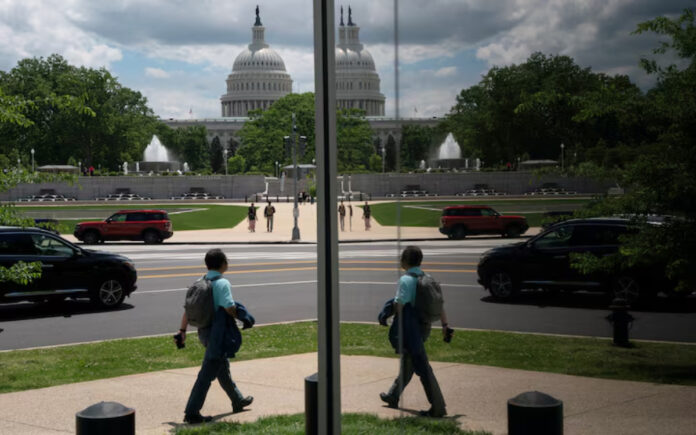Washington: Republicans in the U.S. Congress moved forward with key elements of former President Donald Trump’s expansive budget proposal on Wednesday, as House committees approved measures that would implement massive tax cuts and steep spending reductions—despite mounting criticism from Democrats and dissent within the GOP itself.
With Democrats boycotting the process, Republicans used their control of the House Ways and Means Committee and the Energy and Commerce Committee to advance legislation that would add trillions to the national debt while cutting back on healthcare programs such as Medicaid, which supports millions of low-income and disabled Americans.
The GOP members, voting along party lines, blocked all proposed amendments by Democrats to the Republican-drafted bills. This marks an initial legislative success for Trump-aligned Republicans, though numerous political and procedural obstacles remain before the full package—combining tax reductions, increased borrowing, and social program cuts—can reach Trump’s desk for final approval.
The proposed legislation, which Trump dubbed his “Big Beautiful Bill”, would add approximately $4 trillion to the U.S. debt, which currently stands at $36.2 trillion—equivalent to 127% of the country’s GDP. While the precise cost remains uncertain, the scope of the proposed borrowing is already stirring significant controversy.
House Speaker Mike Johnson expressed optimism about passing the bill ahead of the Memorial Day recess on May 26. Still, internal GOP disagreements continue to pose challenges, especially from moderate Republicans representing high-tax states like New York, New Jersey, and California. Their votes are crucial, given the GOP’s narrow 220-213 majority in the House.
“As this stands right now, I am a ‘no,’ and so they’re going to need to come up with a solution here and quickly if they want to stay on the schedule,” said Representative Mike Lawler of New York, referring to the bill’s restrictions on the state and local tax (SALT) deduction.
Meanwhile, fiscal hardliners within the party are pushing for even deeper cuts to federal spending. “I’m trying to get the math in order to get this country back on track, financially. And it just hasn’t happened,” said Representative Ralph Norman of South Carolina.
After more than 26 hours of deliberation, the Energy and Commerce Committee voted along party lines to advance measures that would tighten Medicaid eligibility requirements. The program currently supports about 71 million Americans, and under the new plan, roughly 7.7 million people could be removed from the rolls, saving the federal government an estimated $715 billion, according to the Congressional Budget Office.
Focus on Planned Parenthood and Drug Pricing
During Wednesday’s proceedings, the committee also debated key issues including abortion, drug pricing, and broader healthcare costs. A significant point of contention was a provision that blocks Medicaid funding to Planned Parenthood, a major healthcare provider for low-income women that offers abortion services in states where it is legal.
Democrats attempted, unsuccessfully, to remove the provision. Representative Lizzie Fletcher of Texas warned the measure would deny essential services—like cancer screenings and prenatal care—even in states where abortion is banned.
Representative Frank Pallone, the committee’s ranking Democrat, criticized the GOP’s approach. “Why are we just talking about numbers, how much we’re going to save to pay for these tax cuts,” he asked, condemning the plan’s focus on cost-cutting over sound health policy.
Republican Representative Buddy Carter defended the Medicaid revisions, saying, “We are trying to stabilize this, to secure it, to save it,” and insisted that the changes would not affect those who legitimately qualify.
Also Read | Microsoft Aims to Settle EU Antitrust Probe with Office-Teams Pricing Shift
Elsewhere, another House panel continued discussions on agricultural and nutrition-related provisions, including proposals to impose work requirements for certain Supplemental Nutrition Assistance Program (SNAP) recipients and to shift more of the program’s costs to state governments.
The broader package also includes the extension of Trump-era tax cuts, which are set to expire at the end of the year, alongside new tax incentives for workers, retirees, and private schools. To help offset the revenue loss, Republicans plan to roll back several green-energy initiatives introduced during President Joe Biden’s administration.
A growing sense of urgency surrounds the legislative push, as the nation approaches its debt ceiling deadline. The Republican package would raise the borrowing limit by $4 trillion, with Treasury Secretary Scott Bessent urging lawmakers to act before mid-July to prevent a potential default that could disrupt the global economy.



